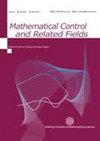具有全状态约束的非严格反馈随机非线性系统的Barrier Lyapunov函数自适应神经跟踪控制:命令滤波方法
IF 0.9
4区 数学
Q1 MATHEMATICS
引用次数: 2
摘要
本文研究了一类具有全状态约束的非严格反馈随机非线性系统的自适应神经网络命令滤波控制器。采用命令滤波方法和误差补偿机制,消除了回溯法和滤波误差引起的“复杂度爆炸”问题。为了避免计算量过大,保证反演方法对非严格反馈结构的正常工作,采用神经网络对包含系统所有状态变量的未知非线性函数进行逼近。同时,构造了屏障Lyapunov函数以确保约束不被违背。最后,基于Lyapunov稳定性定理,提出了一种自适应神经跟踪控制器,保证闭环系统的所有信号在概率上都是半全局一致最终有界(SGUUB),跟踪误差收敛到原点周围的小邻域,且不违反全状态约束。仿真结果验证了所提控制方法的有效性。本文章由计算机程序翻译,如有差异,请以英文原文为准。
Barrier Lyapunov functions-based adaptive neural tracking control for non-strict feedback stochastic nonlinear systems with full-state constraints: A command filter approach
In this paper, an adaptive neural network command filter controller is investigated for a class of non-strict feedback stochastic nonlinear systems with full-state constraints. By using the command filter approach and error compensation mechanism, the "explosion of complexity" problem caused by the backstepping method and the filtering errors are eliminated. In order to avoid excessive and burdensome computations and to ensure that the backstepping method works normally for non-strict feedback structures, neural networks are employed to approximate the unknown nonlinear functions that contain all the state variables of the system. Meanwhile, the barrier Lyapunov functions are constructed to ensure the constraints are not transgressed. Finally, based on the Lyapunov stability theorem, an adaptive neural tracking controller is presented to guarantee that all the signals of the closed-loop system are semi-global uniformly ultimately bounded (SGUUB) in probability, and the tracking error converges to a small neighborhood around the origin, besides the full-state constraints are not violated. The simulation results are given to confirm the effectiveness of the proposed control method.
求助全文
通过发布文献求助,成功后即可免费获取论文全文。
去求助
来源期刊

Mathematical Control and Related Fields
MATHEMATICS, APPLIED-MATHEMATICS
CiteScore
2.50
自引率
8.30%
发文量
67
期刊介绍:
MCRF aims to publish original research as well as expository papers on mathematical control theory and related fields. The goal is to provide a complete and reliable source of mathematical methods and results in this field. The journal will also accept papers from some related fields such as differential equations, functional analysis, probability theory and stochastic analysis, inverse problems, optimization, numerical computation, mathematical finance, information theory, game theory, system theory, etc., provided that they have some intrinsic connections with control theory.
 求助内容:
求助内容: 应助结果提醒方式:
应助结果提醒方式:


